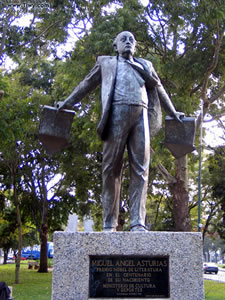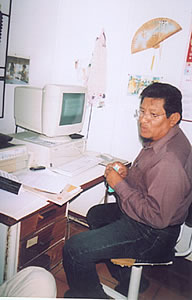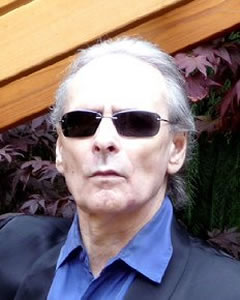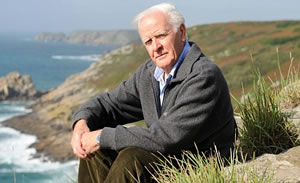De Engelse dichter, schrijver en essayist James Leigh Hunt werd geboren op 19 oktober 1784 in Southgate, Middlesex. Zie ook mijn blog van 19 oktober 2006 en ook mijn blog van 19 oktober 2007 en ook mijn blog van 19 oktober 2008 en ook mijn blog van 18 oktober 2009.
Jenny Kissed Me
Jenny kissed me when we met,
Jumping from the chair she sat in;
Time, you thief, who love to get
Sweets into your list, put that in!
Say I’m weary, say I’m sad,
Say that health and wealth have missed me,
Say I’m growing old, but add,
Jenny kissed me.
A Night-Rain in Summer
Open the window, and let the air
Freshly blow upon face and hair,
And fill the room, as it fills the night,
With the breath of the rain’s sweet might.
Hark! the burthen, swift and prone!
And how the odorous limes are blown!
Stormy Love’s abroad, and keeps
Hopeful coil for gentle sleeps.
Not a blink shall burn to-night
In my chamber, of sordid light;
Nought will I have, not a window-pane,
‘Twixt me and the air and the great good rain,
Which ever shall sing me sharp lullabies;
And God’s own darkness shall close mine eyes;
And I will sleep, with all things blest,
In the pure earth-shadow of natural rest.

Leigh Hunt (19 oktober 1784 – 28 augustus 1859)
De Australische dichter Adam Lindsay Gordon werd geboren op 19 oktober 1833 op de Azoren. Zie ook mijn blog van 19 oktober 2008 en ook mijn blog van 18 oktober 2009.
Whisperings in Wattle-Boughs
Oh, gaily sings the bird, and the wattle-boughs are stirr’d
And rustled by the scented breath of spring ;
Oh, the dreary, wistful longing ! Oh, the faces that are thronging !
Oh, the voices that are vaguely whispering !
Oh, tell me, father mine, ere the good ship cross’d the brine,
On the gangway one mute hand-grip we exchanged,
Do you, past the grave, employ, for your stubborn reckless boy,
Those petitions that in life were ne’er estranged ?
Oh, tell me, sister dear, parting word and parting tear
Never pass’d between us ;—let me bear the blame.
Are you living, girl, or dead ? bitter tears since then I’ve shed
For the lips that lisp’d with mine a mother’s name.
Oh, tell me, ancient friend, ever ready to defend,
In our boyhood, at the base of life’s long hill,
Are you waking yet, or sleeping ? have you left this vale of weeping?
Or do you, like our comrade, linger still ?
Oh, whisper, buried love, is there rest and peace above ?—
There is little hope or comfort here below ;—
On your sweet face lies the mould, and your bed is strait and cold—
Near the harbour where the sea-tides ebb and flow.
. . . . . . .
All silent—they are dumb—and the breezes go and come
With an apathy that mocks at man’s distress ;
Laugh, scoffer, while you may ! I could bow me down and pray
For an answer that might stay my bitterness.
Oh, harshly screams the bird ! and the wattle-bloom is stirr’d !
There’s a sullen weird-like whisper in the bough :
‘Aye, kneel, and pray, and weep, but His beloved sleep
Can never be disturb’d by such as thou !!’

Adam Lindsay Gordon (19 oktober 1833 – 24 juni 1870)
Buste in een park in Penola
De Guatemalteekse schrijver Miguel Ángel Asturias werd geboren op 19 oktober 1899 in Guatemala-Stad. Zie ook mijn blog van 19 oktober 2006. Zie ook mijn blog van 19 oktober 2008 en ook mijn blog van 18 oktober 2009.
Uit: Der grüne Papst (El papa verde, Vertaald door Lene Klein)
„Er steckte den Kopf hinaus — wer würde Geo Maker Thompson erkennen — von unten leuchtete ihn feuchtes Glühwürmchenlicht an — wer würde ihn, verrußt bis zum Kehlkopf, erkennen? Auf der mit Maschinenfett beschmierten Stirn stand der Schweiß wie dicke gläserne Pocken, die großen Knorpel der Ohren brieten in Öl. Der schwache Schein der Lampe, die zu seinen Füßen stand, kletterte durch die Bartstoppeln hinauf, ohne über die Wimpern, die Augen in schwarzen Höhlen, die in Schatten getauchte Stirn und die spitze Nase hinauszugelangen.
Er steckte den Kopf hinaus, und sein Haar war nur Rauch, rötlicher Rauch, Kohlenrauch mit Funken darin, die durch die schwarze, heiße Nacht glühten. Er sah nichts, aber er war mit der Nase draußen, heraus aus dem engen Kesselraum, in dem es nach vermoderten Planken, rostigem, vom Salz zerfressenen Eisen und stickigem Wasserdampf roch. Atmen… Atmen, die Nase in die Lungen des Windes halten, der die Wellen, die schaumgeschwänzten Tiere, tosend antrieb.
Als er sich mit schmerzendem Kreuz aufrichtete, begierig zu atmen, zu sehen, den Kopf hinauszustecken, fiel ihm der Schraubenschlüssel, mit dem er eben nach dem Defekt an der Maschine gesucht hatte, vor die Füße. Von dem Aufprall flackerte die kleine Lampe, die sein Gesicht von unten anleuchtete, ein kaltblütiges Gesicht, das jetzt auch von den tränenbenetzten, überrieselten, gischtübersprühten Steuerbordlichtern beschienen wurde.
Er streckte den Kopf hinaus, einige Sekunden, bevor der kleine Dampfer sich wieder aufrichtete, der, vom Regen gekämmt, Stunde um Stunde gegen den Wind gekämpft hatte, Stunden, die die Uhren der Passagiere nicht anzeigten, denn als die Nacht den zornigen Lack des Karibischen Meeres zu schwärzen begann, war die Zeit stehengeblieben, wartend, daß etwas geschehe, das nur einen Herzschlag lang dauern und das nicht mehr ihr, sondern der Ewigkeit angehören würde, und dieser Stillstand war solcherart gewesen, daß niemand mehr glaubte, das Morgenlicht den Himmel röten zu sehen. Die Helligkeit brach plötzlich, überraschend, wie ein Wunder herein, als der kleine Dampfer die donnernden Wogen an der Landzunge von Manabique hinter sich gelassen hatte — Schaumberge, in denen sie sich wie im Schweif eines Kometen verloren hatten –, und sich das Halbrund dunstiger Wälder an der schlafenden Küste vor ihm auftat.“

Miguel Ángel Asturias (19 oktober 1899 – 9 juni 1974)
Standbeeld in Guatemala Stad
De Surinaamse schrijver Nardo Aluman (eig. Ronald Renardo Aloema) werd geboren in Christiaankondre op 19 oktober 1946. Zie ook mijn blog van 19 oktober 2008 en ook mijn blog van 18 oktober 2009.
Uit: Pairandipo, de menseneter
„Pairandïpo … door Pairandïpo waren lang geleden alle Indianen opgemaakt, kleinkind. Hij had over alle rivieren gezworven. Hij had over zee gezworven. Op deze plaats is hij buiten om over zee aangekomen. Vervolgens is hij in de Suriname-rivier aangekomen. Op die plaats heeft hij Indianen ontmoet, Indianen. Hij had Indianen ontmoet. Vervolgens heeft hij ze allemaal opgegeten, allemaal. De mensen sloegen hem dood, onmiddellijk veranderde zijn bloed in velen van zijn soort. Ha, hoe probeerden de Indianen hem te doden! Zijn doden maakte hem steeds bozer. De Indianen zijn door hem uitgeroeid. Maar hij komt, zijn Indianen-eten brengt hem hierheen. Op deze plaats komt hij, buitenom. In de Cottica al, in de Wanekreek komt hij. Ach, op die plaats eet hij ook Indianen op. De Indianen zijn door hem, opgegeten. Hij at nu eenmaal Indianen, zo was hij nu eenmaal. De Indianen denken na. ‘Wat zullen we beginnen’, zeiden ze. ‘Hoe zullen we het aanpakken’. ‘Degeen die ons opeet. ‘We zullen ons voor hem verstoppen’ zeiden ze. ‘Laten we het water heet maken’, zeiden ze. Veel water, een grote samaku, in een enorme pot maken zij water heet. Daarmee baden ze zijn bloed, opdat hij verandert. Dat helpt een beetje.
Op die plaats in de Cottica, zijn voormalige ijzeren vijzel, daarin stampte hij de botten [van de Indianen]. Nadat hij ze op die plaats had uitgeroeid was er voor hem geen vlees meer. Vervolgens stampte hij hun botten. Hij komt, hij komt! Hij was hier aangekomen, naar de Marowijne. He, de Indianen denken na. ‘Laten we [een kuil] in het zand graven’, zeiden ze, ‘om ons te verbergen’. Ze hadden een grote kuil in het zand gegraven, een grote .. een enorme kuil in het zand om zich erin te verstoppen. Vervolgens maken zij er een rooster boven, er ligt zand op. Ze leggen er zand op, ze sluiten zich op, ginds zijn ze, ze planten er kolo [kalebas] op, degenen die zich verbergen, om zich te camoufleren. Zo had iemand zich verborgen.“

Nardo Aluman (Christiaankondre, 19 oktober 1946)
De Britse schrijver Philip Pullman werd geboren op 19 oktober 1946 in Norwich als zoon van een luchtmachtofficier. Zie ook mijn blog van 19 oktober 2008 en ook mijn blog van 18 oktober 2009.
Uit: The Good Man Jesus and the Scoundrel Christ
‘But I’m an old man!’ said Joseph. ‘And I have sons older than the girl. I shall be a laughing-stock.’
‘Do as you are commanded,’ said Zacharias, ‘or face the anger of the Lord. Remember what happened to Korah.’
Korah was a Levite who had challenged the authority of Moses. As a punishment the earth opened under him and swallowed him up, together with all his household.
Joseph was afraid, and reluctantly agreed to take the girl in marriage. He took her back to his house.
‘You must stay here while I go about my work,’ he told her. ‘I’ll come back to you in good time. The Lord will watch over you.’
In Joseph’s household Mary worked so hard and behaved so modestly that no one had a word of criticism for her. She spun wool, she made bread, she drew water from the well, and as she grew and became a young woman there were many who wondered at this strange marriage, and at Joseph’s absence. There were others, too, young men in particular, who would try to speak to her and smile engagingly, but she said little in reply and kept her eyes on the ground. It was easy to see how simple and good she was.
And time went past.“

Philip Pullman (Norwich, 19 oktober 1946)
De Amerikaanse schrijfster Fannie Hurst werd geboren op 19 oktober 1889 in Hamilton, Ohio. Zie ook mijn blog van 19 oktober 2008 en ook mijn blog van 18 oktober 2009.
Uit: Gaslight Sonatas
„When the two sides of every story are told, Henry VIII. may establish an alibi or two, Shylock and the public-school system meet over and melt that too, too solid pound of flesh, and Xantippe, herself the sturdier man than Socrates, give ready lie to what is called the shrew in her. Landladies, whole black-bombazine generations of them?oh, so long unheard ?may rise in one Indictment of the Boarder: The scarred bureau-front and match- scratched wall-paper; the empty trunk nailed to the floor in security for the unpaid bill; cigarette-burnt sheets and the terror of sudden fire; the silent newcomer in the third floor back hustled out one night in handcuffs; the day-long sobs of the blond girl so suddenly terrified of life-about-to-be and wringing her ringless hands in the fourth-floor hall-room; the smell of escaping gas and the tightly packed keyhole; the unsuspected flutes that lurk in boarders’ trunks; towels, that querulous and endless pssan of the lodger; the high cost of liver and dried peaches, of canned corn and round steak Tired bombazine procession, wrapped in the greasy odors of years of carpet-sweeping and emptying slops,airing the gassy slit of room after the coroner; and padding from floor to floor on a mission of towels and towels and towels Sometimes climbing from floor to floor, a still warm supply of them looped over one arm, Mrs. Kaufman, who wore bombazine, but unspotted and with crisp net frills at the throat, and upon whose soft-looking face the years had written their chirog- raphy in invisible ink, would sit suddenly, there in the narrow gloom of her halls, head against the balustrade. Oftener than not the Katz boy from the third floor front would come lickety-clapping down the stairs and past her, jumping the last four steps …“

Fannie Hurst (19 oktober 1889 – 23 februari 1968)
Eleanor Roosevelt en Fannie Hurst (1962)
De Amerikaanse schrijver Andrew Vachss werd geboren op 19 oktober 1942 in New York. Zie ook mijn blog van 19 oktober 2008 en ook mijn blog van 18 oktober 2009.
Uit: Another Life
„Flower came from inside Immaculata’s body; Michelle had taken Terry’s shivering little body into her arms and never let him go. That happened in the backseat of my car, as I was driving away from what I’d left of the pus-sack who’d been renting the kid out. Come from, come to–no difference. They’re both ours. Our blood. How you look at it doesn’t matter to us. Citizens think a trial verdict depends on the evidence; we know all that counts is who’s on the jury. Some of you get to visit our world, but none of you really see it. Some of you try too hard, stick your nose in too deep. Then you don’t get to leave.
“Only thing that’s true is what you do.” I live that. That’s how I found the one place I rightfully belong. My heart and my life. Your life doesn’t mean any more to me than I ever meant to any of you. Trespassers should bring their own body bags.
I don’t walk the mean streets, I live below them. I’m not an ex-cop with friends on the force; I’m an ex-con who knows the cops for what they are. I’m not a war hero; I’m a man for hire.
Humans who could flat-line a polygraph wouldn’t get past the first round with me. All it takes is a few minutes of conversation, and I know you. Not because I have X-ray eyes. Not because I have powers. Because, whoever you are, I’ve met you before.`

Andrew Vachss (New York, 19 oktober 1942)
De Britse schrijver John le Carré werd geboren op 19 oktober 1931 in Poole, Dorset, Engeland. Zie ook mijn blog van 19 oktober 2006 en ook mijn blog van 18 oktober 2009.
Uit: A Most Wanted Man
“A Turkish heavyweight boxing champion sauntering down a Hamburg street with his mother on his arm can scarcely be blamed for failing to notice that he is being shadowed by a skinny boy in a black coat.
Big Melik, as he was known to his admiring neighborhood, was a giant of a fellow, shaggy, unkempt and genial, with a broad natural grin and black hair bound back in a ponytail and a rolling, free-and-easy gait that, even without his mother, took up half the pavement. At the age of twenty he was in his own small world a celebrity, and not only for his prowess in the boxing ring: elected youth representative of his Islamic sports club, three times runner-up in the North German Championship hundred-meter butterfly stroke and, as if all that weren’t enough, star goalkeeper of his Saturday soccer team.
Like most very large people, he was also more accustomed to being looked at than looking, which is another reason why the skinny boy got away with shadowing him for three successive days and nights.
The two men first made eye contact as Melik and his mother, Leyla, emerged from the al-Umma Travel Shop, fresh from buying air tickets for Melik’s sister’s wedding in their home village outside Ankara. Melik felt someone’s gaze fixed on him, glanced round and came face-to-face with a tall, desperately thin boy of his own height with a straggly beard, eyes reddened and deep-set, and a long black coat that could have held three magicians. He had a black-and-white kaffiyeh round his neck and a tourist’s camel-skin saddlebag slung over his shoulder. He stared at Melik, then at Leyla. Then he came back to Melik, never blinking, but appealing to him with his fiery,sunken eyes.“

John le Carré (Poole, 19 oktober 1931)
